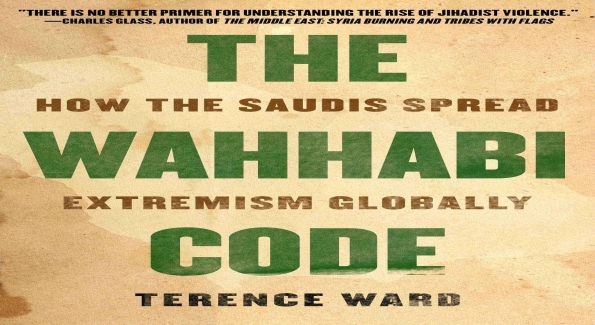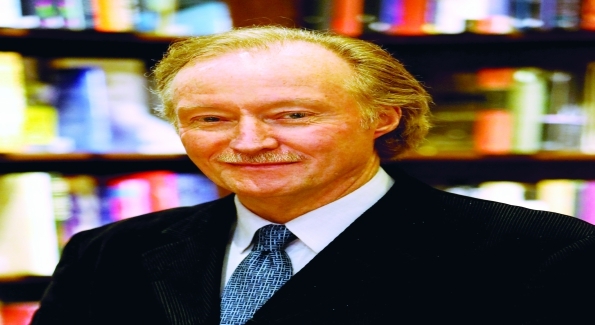UNMASKING THE TRUTH BEHIND JIHADIST VIOLENCE AND SAUDI ARABIA
An exclusive excerpt from the new prologue of ‘The Wahhabi Code: How the Saudis Spread Extremism Globally’
BY TERENCE WARD

Reflecting on the power of global influence in our May 2019 Power 100 issue, we are privileged to have this excerpt from author Terence Ward’s recent book, “The Wahhabi Code: How the Saudis Spread Extremism Globally,” which explores the export of Wahhabism from Saudi Arabia and its links to terrorism in the West.
This book was written to shed light on what the media has widely chosen to ignore since September 11, 2001: how a small puritanical sect of Islam, founded only 250 years ago, has inspired nearly every terrorist attack in the West. It is my strongly held belief that when Europeans and Americans learn to pronounce the word “Wahhabi,” 1.5 billion diverse followers of mainstream Islam—who have been targeted and unjustly blamed for extremism—will be exonerated and freed from the cloud of guilt and discrimination cast by populist politicians who profit by spreading fear.
The truth is that this severe, ultra- conservative Wahhabi sect has served as both Saudi Arabia’s official religion and the core ideology for international terror groups such as ISIS, Al-Qaeda, the Taliban, Al-Shabab, Boko Haram, and Towheed Jumaat. Over decades, the Saudi regime has engaged in a well-crafted mission (Dawa Wahhabiya) to fund charities, mosques, and schools to promote their Wahhabi doctrine across the Middle East and beyond. For years, global leaders at the highest levels of power have avoided speaking publicly about the roots of this extremism. American administrations have even been complicit in its growth.And, this silence has borne bitter fruit.
Meanwhile, in Saudi Arabia, the young crown prince, Mohammad bin Salman (“MBS”) ascended to great heights by eliminating his family rivals. In 2017, he completed a masterfully orchestrated tour of America.
Leading American public relations firms (Burson-Marsteller, Hill+Knowlton, Brownstein Hyatt Farber Schreck,Fleishman Hillard,APCO, Qorvis,The Harbor Group) and a virtual army of 146 lobbyists (comprised of ex-senators, congressmen, ambassadors, and advisors) assured that the prince enjoyed privileged red-carpet access to America’s leaders in Wall Street, Silicon Valley, Houston’s petroleum sector, as well as New York’s Jewish community, Los Angeles’s entertainment industry, and Capitol Hill’s fawning politicos. The prince was presented as a visionary.
Then, on an Istanbul morning in early October of 2018, everything changed. Washington Post journalist, Jamal Khashoggi, entered the Saudi consulate for paperwork related to his upcoming marriage and mysteriously disappeared. The much-lauded Crown Prince began to suffer from the toxic reactions to Khashoggi’s state-sponsored murder.
This dark turn of events revealed another face of Saudi Arabia. The recklessness of MBS unnerved even staunch political supporters. For the first time, Congress united to call for an end of American military support for the Saudi war in Yemen described by the U.N. as “the world’s worst humanitarian disaster” with millions on the verge of starvation.
Many asked whether lifting the ban on women driving or opening three hundred cinemas by 2030 signaled a dramatic break with the old regime.What about the jailed and tortured female activists who led the “right to drive” campaign? Or those women who say “We are our own Guardians,” rebuking MBS’s refusal to end the “guardianship law” that places every woman in Saudi Arabia under the control of a male guardian. Or the 3,000 political prisoners documented by Amnesty International? Or the suffering innocents in neighboring Yemen?
As President Trump rushed to pardon the Crown Prince, Fareed Zakaria reflected on the president’s first official visit abroad to Riyadh in his Washington Post opinion piece, “How Trump Got Played by the Saudis” (May 25, 2017):
The threat from radical Islamist terrorism is ongoing. And President Trump’s journey to the Middle East illustrated yet again how the country central to the spread of this terrorism, Saudi Arabia, has managed to evade and deflect any responsibility for it. In fact,Trump has given Saudi Arabia a free pass and a free hand in the region.The facts are well-known. For five decades, Saudi Arabia has spread its narrow, puritanical, and intolerant version of Islam— originally practiced almost nowhere else—across the Muslim world. Osama bin Laden was Saudi, as were fifteen of the nineteen 9/11 terrorists.And we know, via a leaked email from former secretary of state Hillary Clinton, in recent years the Saudi government, along with Qatar, has been ‘providing clandestine financial and logistic support to the Islamic State and other radical Sunni groups in the region.’ Saudi nationals make up the second-largest group of foreign fighters in the Islamic State and, by some accounts, the largest in the terrorist group’s Iraqi operations.The kingdom is in a tacit alliance with al-Qaeda inYemen.
In an earlier Washington Post piece, “Saudi Arabia, the Devil We Know” (Aug. 25, 2016), Mr. Zakaria explained the turmoil Saudi Arabia has spread globally across the Islamic world and his native country, Pakistan, from his uniquely American Moslem point of view. From his perspective, Wahhabism was a distortion of Islam and has spawned lasting effects:
I believe that Saudi Arabia bears significant responsibility for the spread of a cruel, intolerant, and extremist interpretation of Islam—one that can feed directly into jihadi thinking.This globalized Wahhabism has destroyed much of the diversity within Islam, snuffing out the liberal and pluralistic interpretations of the religion in favor of an arid, intolerant one. Saudi funding of Islamic extremism has not ended, and its pernicious effects can be seen from Pakistan to Indonesia.These funds come from individuals, not the government. Still, it is hard to imagine that the Saudi monarchy cannot turn off the pipeline of money to extremists abroad and at home.
Most Moslems wholeheartedly agree with Mr. Zakaria. Substantial reforms must be made by Islamic scholars to those Wahhabi texts that have inspired so many jihadi groups. MBS has assured the world that such reforms will be forthcoming.
If scholars carefully edit and reform the texts—attributed to the founder of the doctrine, Muhammad Abdul Wahhab—perhaps change can take place with a new clear vision that accepts all other Moslems—Shias, Sufis and Sunnis—and non-Moslems as God’s children.
But there is troubling news. MBS has recently embraced the hardline cleric Saleh al- Fouzan, a member of the Council of Senior Scholars. As recently as 2013, Mr. al-Fouzan claimed that the Shia and other Muslims who do not follow Wahhabi beliefs are infidels and that anyone who disagrees with his interpretation is an infidel. In September of 2018, Mr. al-Fouzan issued a fatwa urging the state to kill political dissidents who promote sedition against the ruler. A month later, Jamal Khashoggi disappeared.
Two months after the murder, in December 2018, the entire US Senate voted unanimously to condemn the Crown Prince for his responsibility in Khashoggi’s death; it was a rare moment of unity for the unruly Congress. Once-loyal Republican Senator Lindsey Graham called MBS a “wrecking ball” and said “there’s no smoking gun, there’s a smoking saw,” while Senator Rand Paul spoke of “ending weapons sales to Saudi Arabia” as punishment.
In private, secret service agents, intelligence officers, politicos and journalists had long known about the Saudi “double game” of publicly denying involvement with violence while turning a blind eye to those who aid and abet it behind the scenes.
Today, Israel and Saudi Arabia’s shared loathing of Iran has bound them together as allies. America stands at the precipice of a new war. Recent history shows that America is very capable of starting wars but quite incompetent at ending them.
Since President Trump tore up America’s nuclear deal with Iran, there has been a growing fear that he will lead the country into another ruinous Middle Eastern conflict. The Crown Prince and Prime Minister Netanyahu have aggressively lobbied the President and the Pentagon to launch a pre-emptive bombing campaign against Iran. We should be very wary.
Perhaps the most dramatic truth that we all must calmly consider before America stumbles into this new ill-conceived conflict was summed up by the analysis of the Global Terrorism Database managed by Professor Leif Wenar of King’s College London.
…more than 94 percent of deaths caused by Islamic terrorism since 2001 were perpetrated by the Islamic State, al-Qaeda and other Sunni jihadists. Iran is fighting those groups, not fueling them. Almost every terrorist attack in the West has had some connection to Saudi Arabia.Virtually none has been linked to Iran.”
Professor Wenar then added that the Saudi export of Wahhabism, which is estimated by the U.S. State Department to have cost $10 billion, “may be the most expensive ideological campaign in human history.”
With these facts in mind, how can anyone in the U.S. administration be considering sales of nuclear technology to Saudi Arabia? The risk of a third world war is growing. Aggression against Iran risks rupturing ties with Europe and NATO, while provoking conflict with both Russia and China.Yet, the White House may be tempted because no sitting president has ever lost an election when the nation was at war. If missiles are launched and bombs fall, the narrow Strait of Hormuz that is the gateway in and out of the Persian Gulf will surely be closed to oil tankers until the shooting ends. As shortages occur, lights of the industrial world will dim.As oil prices soar, shock waves will panic global markets. This Wahhabi-Shia conflagration may well usher in a time of lighting candles, unless cooler heads prevail.





